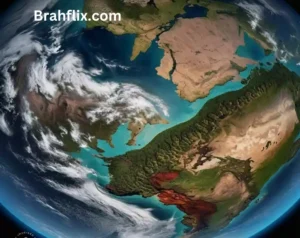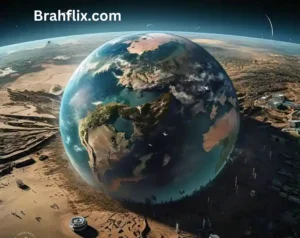Introduction
As we move closer to 2025, many are asking: What will happen to Earth in 2025? With rapid advancements in technology, ongoing environmental challenges, and evolving societal dynamics, the year 2025 promises to be a pivotal moment for our planet. This article explores key predictions and potential changes that may shape our world in the near future.
Key Takeaways:
- Climate Change: Significant impacts expected from rising temperatures and extreme weather events.
- Technological Advancements: Innovations could dramatically alter daily life and industry.
- Societal Shifts: Changes in demographics, politics, and global economies may reshape societies.
1. Climate Change and Environmental Impact
The question, What will happen to Earth in 2025? inevitably includes concerns about climate change. Rising global temperatures and increased frequency of extreme weather events are projected to continue affecting ecosystems and human societies.
Temperature Trends and Predictions
The Intergovernmental Panel on Climate Change (IPCC) forecasts that global temperatures will rise by approximately 1.5°C above pre-industrial levels by 2025 if current trends continue. This increase could exacerbate heatwaves, droughts, and heavy rainfall events.
Impact on Ecosystems
Ecosystems are highly sensitive to temperature changes. Coral reefs, for instance, face bleaching and die-off as ocean temperatures rise. Forests may experience increased pest infestations and fires.
Sea-Level Rise
Melting ice caps and glaciers contribute to rising sea levels. Coastal areas may face flooding and erosion, affecting millions of people globally.
Statistics: The IPCC estimates that sea levels could rise by up to 0.3 meters by 2025, significantly impacting low-lying coastal regions.
2. Technological Advancements
Another crucial aspect of what will happen to Earth in 2025 involves technological progress. Innovations in various fields are set to revolutionize daily life, industry, and communication.
Artificial Intelligence (AI)
AI is expected to become more integrated into everyday life, from self-driving cars to advanced medical diagnostics. AI could enhance efficiency in industries like agriculture, manufacturing, and logistics.

Renewable Energy
The shift towards renewable energy sources such as solar and wind power is anticipated to accelerate. Innovations in energy storage and grid management will support this transition, potentially reducing reliance on fossil fuels.
Space Exploration
Space missions are likely to advance, with projects like NASA’s Artemis aiming to return humans to the Moon and explore Mars. Private companies are also investing in space tourism and resource mining.
Statistics: According to Statista, global spending on AI technologies is projected to exceed $500 billion by 2025.
3. Societal and Demographic Changes
Societal shifts are another crucial factor in answering What will happen to Earth in 2025? Changes in demographics, politics, and global economies will influence the social fabric of nations.
Population Growth and Urbanization
The global population is expected to reach around 8 billion by 2025. Urbanization will continue, with more people living in cities, leading to increased demand for infrastructure and services.
Economic Shifts
Emerging economies are likely to play a larger role in the global economy. Countries in Asia and Africa may experience significant growth, altering global trade dynamics and economic power balances.
Political Changes
Geopolitical tensions and shifts in power may affect global stability. Issues such as trade disputes, conflicts, and international agreements will shape the global political landscape.
Statistics: The UN estimates that urban areas will house about 68.4% of the world’s population by 2025.
4. Health and Medicine
Advancements in health and medicine will also be crucial in determining What will happen to Earth in 2025? The focus will be on improving healthcare outcomes and managing emerging health challenges.
Medical Innovations
Breakthroughs in genomics, personalized medicine, and biotechnology will enhance disease prevention and treatment. AI and machine learning will support more accurate diagnostics and tailored therapies.
Global Health Challenges
New health threats, such as pandemics or antibiotic resistance, may emerge. Global health systems must be prepared to address these challenges through international cooperation and improved health infrastructure.
Statistics: According to the World Health Organization, global healthcare spending is expected to grow by 5.4% annually, reaching $11.9 trillion by 2025.
5. Environmental Policies and Agreements
To address the question of What will happen to Earth in 2025? it’s essential to consider the role of environmental policies and international agreements in shaping our future.

Climate Agreements
The Paris Agreement aims to limit global warming to well below 2°C. By 2025, countries will need to demonstrate progress towards their climate goals, including emission reductions and sustainable practices.
Local Initiatives
Cities and local governments are increasingly implementing sustainability measures, such as green infrastructure and waste reduction programs. These local efforts complement global agreements and can drive significant change.
Innovation in Policy
Policymakers are exploring innovative approaches to environmental protection, including carbon pricing, conservation efforts, and sustainable development practices.
Statistics: Over 190 countries are parties to the Paris Agreement, committing to limit global temperature rise and reduce greenhouse gas emissions.
6. Economic Development and Technological Integration
The integration of technology into the economy will impact various sectors, answering What will happen to Earth in 2025? Here’s how technological advancements will drive economic development.
Digital Transformation
Industries across the board are undergoing digital transformation, with increased use of cloud computing, big data analytics, and automation. This shift will enhance productivity and create new business models.
Future of Work
The nature of work will evolve with advancements in robotics and AI. Job markets will need to adapt, with a focus on reskilling and upskilling workers to meet the demands of new technologies.
Statistics: The World Economic Forum predicts that automation will displace 85 million jobs by 2025 but also create 97 million new roles.
7. Education and Knowledge Dissemination
Education systems will need to adapt to meet future demands, contributing to What will happen to Earth in 2025? The focus will be on integrating technology and preparing students for a rapidly changing world.
EdTech Innovations
Educational technology (EdTech) will enhance learning experiences through virtual classrooms, interactive simulations, and personalized learning paths.

Lifelong Learning
As technology evolves, continuous learning will become essential. Educational institutions and online platforms will provide opportunities for lifelong learning and professional development.
Statistics: The global EdTech market is expected to reach $404 billion by 2025.
8. Cultural and Social Trends
Cultural and social trends will shape the way we live and interact, influencing the answer to What will happen to Earth in 2025? Here’s how these trends may unfold.
Globalization and Cultural Exchange
Increased connectivity will foster greater cultural exchange and global collaboration. This will influence cultural norms, practices, and perspectives.
Social Movements
Social movements advocating for environmental sustainability, equality, and justice will gain momentum. These movements will drive societal change and impact policy decisions.
Digital Communication
The rise of social media and digital communication platforms will continue to influence how people connect, share information, and participate in public discourse.
Statistics: Over 4.8 billion people are active internet users, with social media usage growing by 9.2% annually.
9. Innovations in Transportation
Transportation innovations will play a significant role in shaping the future, answering What will happen to Earth in 2025? Here’s a look at the expected developments.
Electric and Autonomous Vehicles
The adoption of electric vehicles (EVs) and autonomous driving technology will transform transportation systems. These advancements will reduce emissions and improve road safety.
Public Transit Upgrades
Cities will invest in modernizing public transit systems, including high-speed rail and smart transit solutions, to address congestion and environmental concerns.
Sustainable Transportation
Sustainable practices, such as bike-sharing programs and green logistics, will become more prevalent, contributing to reduced environmental impact.
Statistics: The global electric vehicle market is expected to grow at a CAGR of 22.1%, reaching $823 billion by 2025.
FAQs
What are the primary environmental concerns for 2025?
Key concerns include climate change, rising sea levels, and increased frequency of extreme weather events.
How will technological advancements impact daily life in 2025?
Technological advancements will improve efficiency, enhance healthcare, and revolutionize transportation and communication.
What role will renewable energy play in 2025?
Renewable energy will be crucial in reducing reliance on fossil fuels and mitigating climate change effects.
How will population growth affect global economies by 2025?
Population growth will drive demand for infrastructure, services, and resources, impacting economic development and urbanization.
What are the expected advancements in healthcare by 2025?
Expect breakthroughs in genomics, personalized medicine, and increased use of AI for diagnostics and treatment.
Conclusion
As we look ahead to 2025, numerous factors will shape the future of our planet. From the impacts of climate change and technological innovations to societal shifts and advancements in healthcare, the year 2025 promises to be a pivotal moment. Understanding these dynamics helps us prepare for the changes and challenges that lie ahead.
What do you think will be the most significant changes by 2025? Share your thoughts in the comments below and explore more of our articles to stay informed about the future.
CTA: For more insights on upcoming trends and innovations, check out our other blogs on technology, environmental issues, and future predictions!